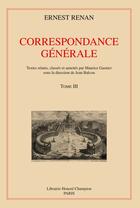-
Date de parution : 31/08/2022
-
Editeur :
Culturea
-
EAN : 9782385083588
-
Série :
(-)
-
Support :
Papier
Résumé:
Ernest Renan was born in 1823, at Tréguier in Brittany. He was educated for the priesthood, but never took orders, turning at first to teaching. He continued his studies in religion and philology, and, after traveling in Syria on a government commission, he returned to Paris and became professor... Voir plus
Ernest Renan was born in 1823, at Tréguier in Brittany. He was educated for the priesthood, but never took orders, turning at first to teaching. He continued his studies in religion and philology, and, after traveling in Syria on a government commission, he returned to Paris and became professor of Hebrew in the Collège de France, from which he was suspended for a time on account of protests against his heretical teachings. He died in 1892.
Renan's activity divides itself into two parts. The first culminated in his two great works on the Origins of Christianity and on the History of Israel. As to the scientific value of these books there is difference of opinion, as was to be expected in a treatment of such subjects to the exclusion of the miraculous. But the delicacy and vividness of his portraits of the great personalities of Hebrew history, and the acuteness of his analysis of national psychology, are not to be denied.
The other part of his work is more miscellaneous, but most of it is in some sense philosophical or autobiographical. Believing profoundly in scientific method, Renan was unable to find in science a basis for either ethics or metaphysics, and ended in a skepticism often ironical, yet not untinged with mysticism. He was an amazing writer, says M. Faguet, and disconcerted criticism by the impossibility of explaining his methods of procedure; he was luminous, supple, naturally pliant and yielding; beneath his apparently effeminate grace an extraordinary strength of character would suddenly make itself felt; he had, more than any nineteenth-century writer, the quality of charm; he exercised a caressing influence which enveloped, and finally conquered, the reader.
In no kind of writing was Renan's command of style more notable than in the description of scenery. In his pictures of his native Brittany in the essay on The Poetry of the Celtic Races, as well as in his analysis of national qualities, two of his most characteristic powers are admirably displayed.
Donner votre avis















